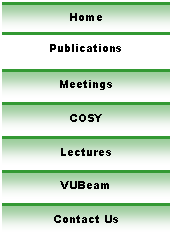
|
Reprint Server |



The Differential Algebra Based Multiple Level Fast Multipole Algorithm for 3D Space Charge Field Calculation and Photoemission Simulation
Abstract
Coulomb interaction between charged particles inside a bunch is one of the most important collective effects in beam dynamics, becoming even more significant as the energy of the particle beam is lowered to accommodate analytical and low-Z material imaging purposes such as in the time resolved Ultrafast Electron Microscope (UEM) development currently underway at Michigan State University. Space charge effects are the key limiting factor in the development of ultrafast atomic resolution electron imaging and diffraction technologies and are also correlated with an irreversible growth in rms beam emittance due to fluctuating components of the nonlinear electron dynamics. In the short pulse regime used in the UEM, space charge effects also lead to virtual cathode (VC) formation in which the negative charge of the electrons emitted at earlier times, combined with the attractive surface field, hinders further emission of particles and causes a degradation of the pulse properties. Space charge and virtual cathode effects and their remediation are core issues for the development of the next generation of high-brightness UEMs. Since the analytical models are only applicable for special cases, numerical simulations, in addition to experiments, are usually necessary to accurately understand the space charge effect. In this paper we will introduce a grid-free differential algebra (DA) based multiple level fast multipole algorithm (MLFMA), which calculates the 3D space charge field for n charged particles in arbitrary distribution with an efficiency of O(n), and the implementation of the DA based MLFMA to a simulation code for space charge dominated photoemission process.H. Zhang, J. Portman, Z. Tao, P. Duxbury, C.-Y. Ruan, K. Makino, M. Berz, Microscopy and Microanalysis 21 Suppl. 4 (2015) 224
Download
Click on the icon to download the corresponding file.
![]() Download Adobe PDF version (667106 Bytes).
Download Adobe PDF version (667106 Bytes).
Go Back to the reprint server.
Go Back to the home page.
This page is maintained by Kyoko Makino. Please contact her if there are any problems with it.